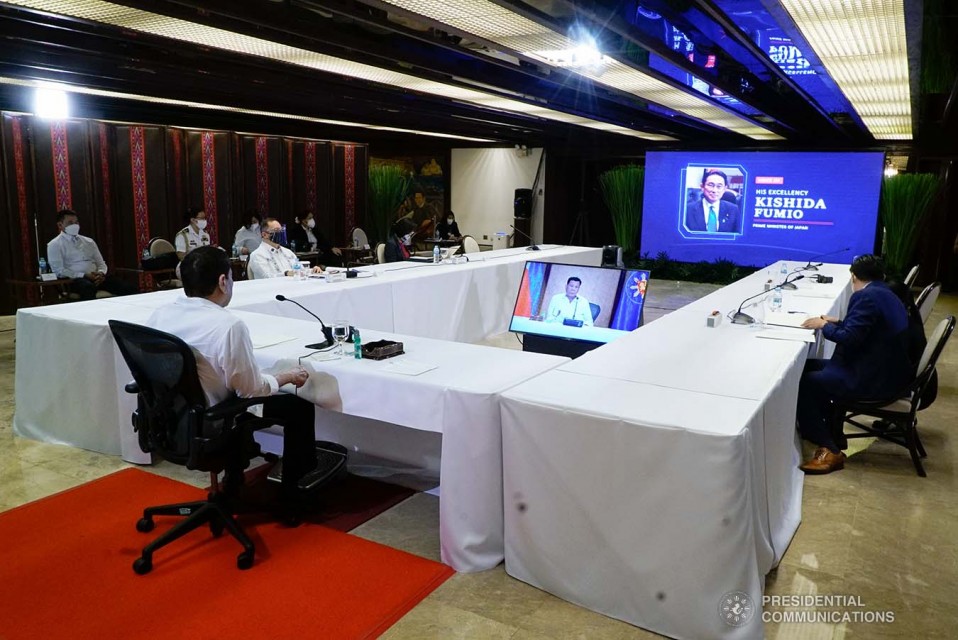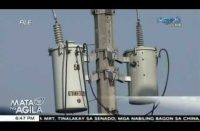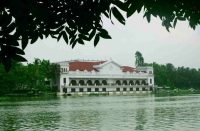
(Eagle News) — President Rodrigo Duterte and Japanese Prime Minister Fumio Kishida renewed their commitment to strengthen the strategic partnership between the Philippines and Japan, with the leaders agreeing that it was “high time for the Philippines and Japan to pursue deeper security engagement and coordination.”
This is “by launching a Foreign and Defense Ministerial Meeting or 2+2 meeting” between the Philippines and Japan, according to a statement released by Malacanang.
Among the regional developments and multilateral issues discussed by the two Asian leaders were the South China Sea, the Myanmar situation, the Korean Peninsula and nuclear nonproliferation in the Asian region.
President Duterte described Japan as “indeed a friend closer than a brother” through the years as it continued to help in the development of the country and gave timely assistance to the Philippine government’s COVID-19 pandemic response and recovery efforts.
“Japan is unrivaled among our bilateral partners,” the 76-year old Philippine leader said during his telephone conversation with 64-year old Prime Minister Kishida on Nov. 17.
“President Duterte said that he looks forward to the successful implementation of projects and activities aimed at enhancing Philippines-Japan cooperation in maritime security, particularly maritime domain awareness, maritime connectivity and preservation of the marine environment,” said a statement released by Malacanang regarding the two leaders’ discussion.
-Strategic partnership-
During the telephone conversation, the two leaders also renewed the commitment to “further deepen their strategic partnership to address challenges of mutual interest such as peace and security, infrastructure development, and the coronavirus pandemic,” Malacanang said in a release.
Duterte acknowledged Japan’s support for the administration’s Build, Build, Build program, the peace process and grassroots development in Mindanao and the ongoing transition process of the Bangsamoro Autonomous Region in Muslim Mindanao (BARMM).
-PHL-Japan relations reached “golden age” during Duterte admin, says Japan PM-
For his part, Prime Minister Kishida said that Philippines-Japan relations have indeed reached its golden age under President Duterte’s administration.
He said Japan will continue to support the Philippines’ peace and development agenda in Mindanao, Build, Build, Build program and efforts to combat the COVID-19 pandemic.
“Prime Minister Kishida also conveyed his Government’s readiness to further strengthen Philippines-Japan partnership in maritime security, including by supporting the upgrading of the country’s maritime law enforcement capabilities,” said the statement released by the Palace on the discussion of the two leaders.
The two Leaders also agreed to undertake an exchange of visits at a mutually agreed time to further reaffirm the Philippines-Japan partnership and personal
friendship.
-Milestones in PHL-Japan relations-
This year, the Philippines and Japan celebrate two milestones – 65 years of normalized diplomatic relations and 10 years of Strengthened Strategic Partnership
During their phone conversation, President Duterte also congratulated Prime Minister Kishida on his election and the Government of Japan on the success of the Tokyo Olympics and Paralympic Games.
The President also recalled Prime Minister Kishida’s visit in Davao in August 2016 when the latter paid a courtesy call as Foreign Minister of Japan. Prime Minister Kishida was the first Foreign Minister received by President Duterte.
Former prime minister Yoshihide Suga stepped down last month after just a year in the job, partly due to public dissatisfaction with his government’s pandemic response.
Prime Minister Kishida, who led the ruling coalition to victory in general elections early November, replaced him and promised to make the virus “top priority”.
(with a report from PND, Agence France Presse)






